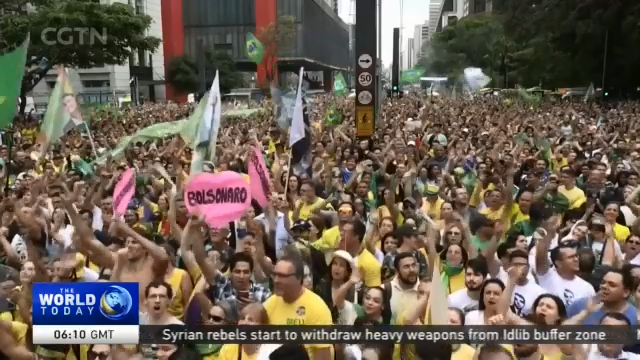
14:42, 07-Oct-2018
Brazil Elections: Voters head to the polls for new president
Updated
14:41, 10-Oct-2018
03:22

Nearly 150 million Brazilians are eligible to vote in Sunday's elections. They'll be choosing a majority of the country's political seats. But, many say they're only really concerned with one seat: the president's. CGTN's Lucrecia Franco explains.
A typical street market in Copacabana, as election day approaches, political discussions intensify.
The split is almost exclusively between two candidates. One from the leftist Workers Party, Fernando Haddad.
ANDRE SANTOS STREET VENDOR "I am for Haddad, because I don't believe in Bolsonaro's proposals because they are lies."
And the other on the far-right, Jair Bolsonaro, whose remarks have offended women, Afro-Brazilians and minorities.
MARCO ANTONIO AVELAR LAWYER "I am for Bolsonaro. I don't like him. I don't think he is the best candidate, but he is the only one that can beat the leftists in this country."
Polls suggest the election is one of the most polarized in decades.
LUCRECIA FRANCO RIO DE JANEIRO "Brazil's deep divide between a far-right wing candidate and a leftist started in 2016 with the impeachment of former President Dilma Rousseff."
Bolsonaro, the leading candidate, made headlines when he voted for Rousseff's impeachment in the name of the general who ordered her torture when she was a leftist guerrilla.
It was a declaration of war against the Workers Party and, with Rousseff's impeachment, the worst recession in the country's history and a widespread graft scandal, Bolsonaro emerged as a corruption-free strongman candidate.
Haddad, a former Sao Paulo mayor, replaced former president Lula da Silva, who was barred from running because of a corruption conviction. An opinion poll by Datafolha released Thursday shows Haddad has surged into second place with 22 percent but he still trails Bolsonaro who has 35 percent of voter support.
Neither candidate appears to have the 50 percent necessary for a first ballot victory.
Political analysts say the centrist parties may be the biggest casualty because they expected to attract more of the electorate.
GERALDO MONTEIRO POLITICAL ANALYST, RIO DE JANEIRO STATE UNIVERSITY "So it's well characterized these extremes, the two poles and at the middle, the political center, has simply disappeared."
On Friday, Bolsonaro attempted to distract attention from the last televised presidential debate by giving an exclusive interview on a rival channel at the same time. He's recovering from a near-fatal knife attack while campaigning.
Observers say there is political fatigue in Brazil, but after Sunday, all sides will have their answer with the likelihood of a runoff between the two top vote winners at the end of the month. Lucrecia Franco, CGTN, Rio de Janeiro.

SITEMAP
Copyright © 2018 CGTN. Beijing ICP prepared NO.16065310-3
Copyright © 2018 CGTN. Beijing ICP prepared NO.16065310-3